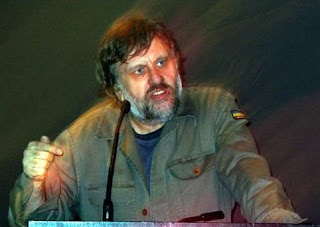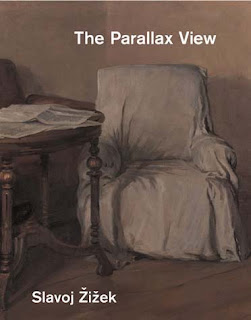Slavoj Zizek (1949) over Spinoza en (Franse) spinozisten
 Žižek is een Sloveense marxistische socioloog, filosoof, psychoanalyticus en cultuurcriticus - een van de meest provocerende denkers van deze tijd met een flamboyante persoonlijkheid en sterk polemische debatstijl. Hij is filosofieprofessor en sociologische onderzoeker aan de Universiteit van Ljubljana, zijn geboorteplaats in Slovenië.
Žižek is een Sloveense marxistische socioloog, filosoof, psychoanalyticus en cultuurcriticus - een van de meest provocerende denkers van deze tijd met een flamboyante persoonlijkheid en sterk polemische debatstijl. Hij is filosofieprofessor en sociologische onderzoeker aan de Universiteit van Ljubljana, zijn geboorteplaats in Slovenië.
Hij werd vooral bekend door zijn gebruik van de theorieën van Jacques Lacan, waarmee hij de populaire cultuur interpreteert; hij combineert deze analyse met zijn marxistische achtergrond in een radicale kritiek van het kapitalisme. Hij becommentarieert recente gebeurtenissen - zo schreef hij een boek over de Irakoorlog, waarin hij de ideologische motivering van die oorlog kritiseert: The Borrowed Kettle.
Hij schreef ook over Spinoza, niet als aanhanger of volgeling, maar leest hem vanuit Hegel en Lacan. Hij voelt weinig voor wat hij omschrijft als de ‘modieuze terugkeer tot Spinoza’ en hij levert kritiek op Spinoza-lezingen van hedendaagse, vooral Franse spinozisten en levinasisten die volgens hem een ‘radicaal anti-Hegelianisme’ laten zien (alsof Hegel, gecorrigeerd door Marx dan, het helemaal is).
 In de ‘Introduction: Dialectical Materialism at the Gates’ van The Parallax View schrijft hij over Spinoza: [..] although Spinoza criticized the Cartesian cogito, he criticized it as a positive ontological entity—but he implicitly fully endorsed it as the “position of the enunciated,” the one which speaks from radical self-doubting, since, even more than Descartes, Spinoza spoke from the interstices of the social space(s), neither a Jew nor a Christian.
In de ‘Introduction: Dialectical Materialism at the Gates’ van The Parallax View schrijft hij over Spinoza: [..] although Spinoza criticized the Cartesian cogito, he criticized it as a positive ontological entity—but he implicitly fully endorsed it as the “position of the enunciated,” the one which speaks from radical self-doubting, since, even more than Descartes, Spinoza spoke from the interstices of the social space(s), neither a Jew nor a Christian.
Spinoza is, in effect, the “philosopher as such,” with his subjective stance of double outcast (excommunicated even from the community of the outcasts of Western civilization); this is why we should use him as a paradigm that enables us to discover the traces of a similar displacement, a communal “out-of-joint,” with regard to all other great philosophers, up to Nietzsche, who was ashamed of the Germans and proudly emphasized his alleged Polish roots. For a philosopher, ethnic roots, national identity, and so on, are simply not a category of truth—or, to put it in precise Kantian terms, when we reflect upon our ethnic roots,we engage in a private use of reason, constrained by contingent dogmatic presuppositions; that is to say,we act as “immature” individuals, not as free human beings who dwell in the dimension of the universality of reason.This, of course, does not in any way entail that we should be ashamed of our ethnic roots; we can love them, be proud of them; returning home may warm our hearts—but the fact remains that all this is ultimately irrelevant.We should act like Saint Paul who, while he was proud of his particular identity (a Jew and a Roman citizen), was nonetheless aware that, in the proper space of the Christian absolute Truth, “there is neither Jew nor Greek.” . . .The struggle which truly engages him is not simply “more universal” than that of one ethnic group against another; it is a struggle which obeys an entirely different logic: no longer the logic of one self-identical substantial group fighting another group, but of an antagonism that cuts diagonally across all particular groups." [van hier]
Hierna neem ik enige links op naar interessante [discutabele maar leerzame] teksten van hem over Spinoza. Vooral lezenswaard is zijn PHILOSOPHY • Spinoza, Kant, Hegel and... Badiou uit 2007. Daarin stelt hij dat Spinoza, Kant, en Hegel samen de hele filosofie omvatten. Hij behandelt een drietal consequenties van Spinoza’s Substantiebegrip: de neutraliteit van gevolgelijke zaken op het punt van ‘goed’ en ‘slecht’; de verwerping van elke negativiteit (niets kan uit zichzelf vernietigd worden, alleen door oorzaken van buitenaf); imperfectie bestaat niet; de afwezigheid van iets kan geen positieve rol vervullen; met deze positiviteit van het bestaande hangt Spinoza’s radicale gelijkstelling van macht/vermogen en recht samen); en tenslotte de afwezigheid van elke ‘deontologische’ dimensie: Spinoza’s ongehoorde poging ethiek buiten elke ‘antropomorfe’ morele categorieën als intenties, bevelen etc. te ontwerpen – een ontologische ethiek ontdaan van elke plicht-dimensie, “an ethics of ‘is’ without ‘ought’”. Opvallend vind ik de enigszins laconieke wijze, met wat ironische vraagjes, waarmee hij dit alles aan de kant schuift. Bij de manier waarop hij vervolgens Kant behandelt doet hij net alsof Kant met Spinoza in debat was, terwijl uit niets blijkt dat Kant Spinoza gelezen had; in de Kritik der Reine Vernuft komt Spinoza nergens voor. Pas later, toen Jacobi met zijn boek over Lessings spinozisme kwam, waarin hij ook Kant noemde, kwam Kant – die volstrekt niets met de tot dan toe verguisde en gedemoniseerde Spinoza te maken wilde hebben, met een boekje over Spinoza. Maar dit terzijde. (“Philosophy as such is Kantian” schrijft Žižek; iets dergelijks hebben we van Hegel gehoord voor wie filosofie spinozisme is of geen filosofie is – om Spinoza vervolgens onderuit te halen). Enfin, verder in het artikel sleept Žižek in mijn ogen allerlei niet ter zaken doende zaken aan die al met al een mist laten ontstaan, waardoor onduidelijker wordt wat hij nu eigenlijk wil betogen. Tussendoor heeft hij ook nog wel enige houtsnijdende kritieken gegeven op vooral Franse spinozisten. Hier volsta verder ik met het opnemen van een informatieve voetnoot uit een andere tekst, waarbij ik de verhouding omdraai: de noot als tekst en de bijbehorende tekst als noot. Dit alles om in dit blog enig idee van Žižek te geven. Blinded as we all are with the "French" Spinoza in all his different guises, from Althusser through Deleuze to Negri, one should not forget OTHER readings of Spinoza which played a crucial role in theoretical orientations whose very mention gives shudder to "postmodern" Leftists. First, Spinoza was a crucial reference in the work of Georgi Plekhanov, the key theoretical figure of Russian Social Democracy, who, a century ago, was the first to evelate Marxism into an all-encompassing world-view (incidentally, he also coined the term "dialectical materialism) - against Hegel, he designated Marxism as "modern Spinozism"... Then, the reference to Spinoza is central for the work of Leo Strauss, the father figure of today's US neo-conservatives: for Strauss, Spinoza provides a model for the split between popular ideology appropriate for ordinary people and true knowledge that should remain accessible only to the few. Last but not least, Spinoza's anti-Cartesian teaching on the human soul is considered an authority among some most influential of today's cognitivists and brain scientists - Antonio Damasio even wrote a popular book Looking for Spinoza. It is thus as if every postmodern "French" figure of Spinoza is accompanied by an obscene disavowed double or precursor: Althusser's proto-Marxist Spinoza - "with Plekhanov"; Negri's anti-Empire Spinoza of the multitude - "with Leo Strauss"; Deleuze's Spinoza of affects - "with Damasio"...[foto van wiki] [i]
Bronnen
Slavoj Zizek, PHILOSOPHY • Spinoza, Kant, Hegel and... Badiou! [2007] Teksten over Spinoza in zijn boek The Parallax ViewInterview van Josefina Ayerza met Slavoj Zizek: It Doesn't Have To Be a Jew
WikipediaSlavoj Zizek about love


